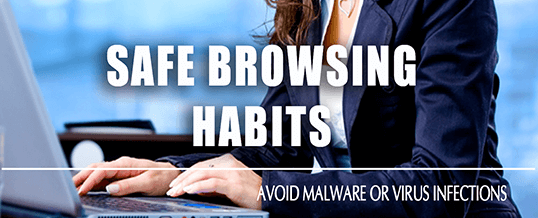Safe Browsing Habits
Here are some simple browsing techniques that if you follow can significantly reduce the chance of your computer becoming infected.
- Use an anti-virus software
- Update anti-virus and anti-malware programs. New viruses are produced daily and this is why we constantly have to update the virus definitions and stay ahead of the bad guys.
- Always update Windows. These updates contain security updates that will help in your fight against viruses. If you do not perform regular Windows updates you are leaving your computer in a vulnerable state.
- Be cautious when viewing popups. Some popups contain viruses which can be triggered at the press of a button.
- When surfing the internet avoid websites that contain illegal software downloads, sexual references, free screensavers, etc. If you go near these sites you are immediately asking for trouble.
- Never respond to Spam e-mails.
- Never open e-mail attachments from people you don’t know. Even if you know the sender there is still a possibility that the e-mail will carry a virus. It’s possible that your e-mail account can be hijacked and used to send spam to your contacts. If you are ever in doubt, e-mail the sender to make sure they sent it to you.
- Before clicking on links in your e-mail, hover your mouse over the link and a window will appear. Make sure the link in the window matches the link you are about to click. You could potentially be redirected a malicious website.
- Avoid using your e-mail address for random registrations. It is highly advisable to create a throwaway e-mail for programs/sites that require registration.
- Avoid using peer-to-peer (P2P) network programs. Bittorrent, Limewire, Bearshare etc are programs through which viruses can spread easily. Always make sure that you know what you are downloading.
- Viruses sometimes mask themselves as anti-virus applications such as fake “Windows Security” and simulate an online scan that fraudulently claims to find many non-existent malware on the victims system. If a window such as the example below appears, don’t click anywhere on it (even the cancel button!), doing so may trigger the installation of the actual virus.
 The Harsh Reality:Security software is a first line of defense against a very real threat of computer compromise and data theft. Your computer can be infected even with the use of security software, so the best protection is safe browsing habits. Be cautious. If it seems too good to be true, that is because it is. An infected computer can cost hundreds of dollars to repair, so restrict your browsing to reputable sites, and if you aren’t sure, don’t do it.
The Harsh Reality:Security software is a first line of defense against a very real threat of computer compromise and data theft. Your computer can be infected even with the use of security software, so the best protection is safe browsing habits. Be cautious. If it seems too good to be true, that is because it is. An infected computer can cost hundreds of dollars to repair, so restrict your browsing to reputable sites, and if you aren’t sure, don’t do it.

